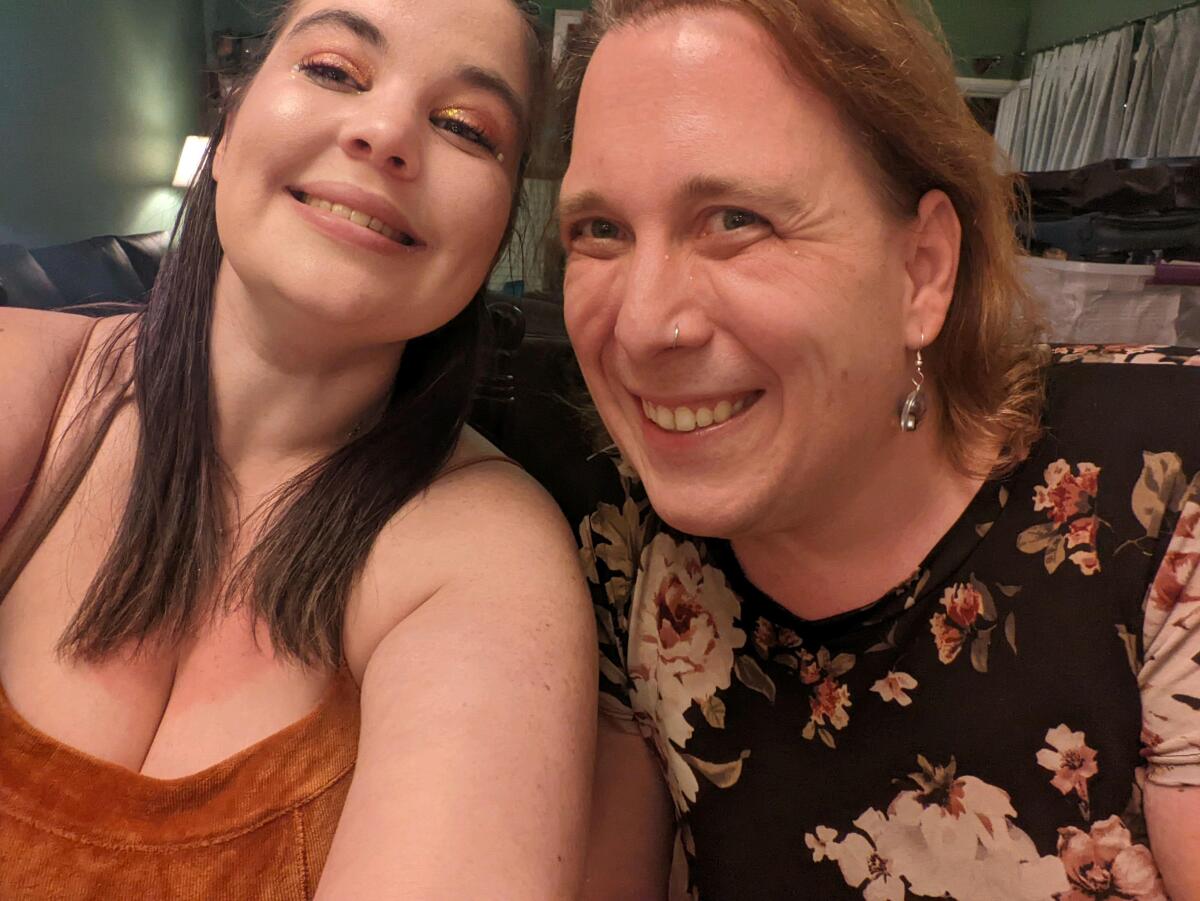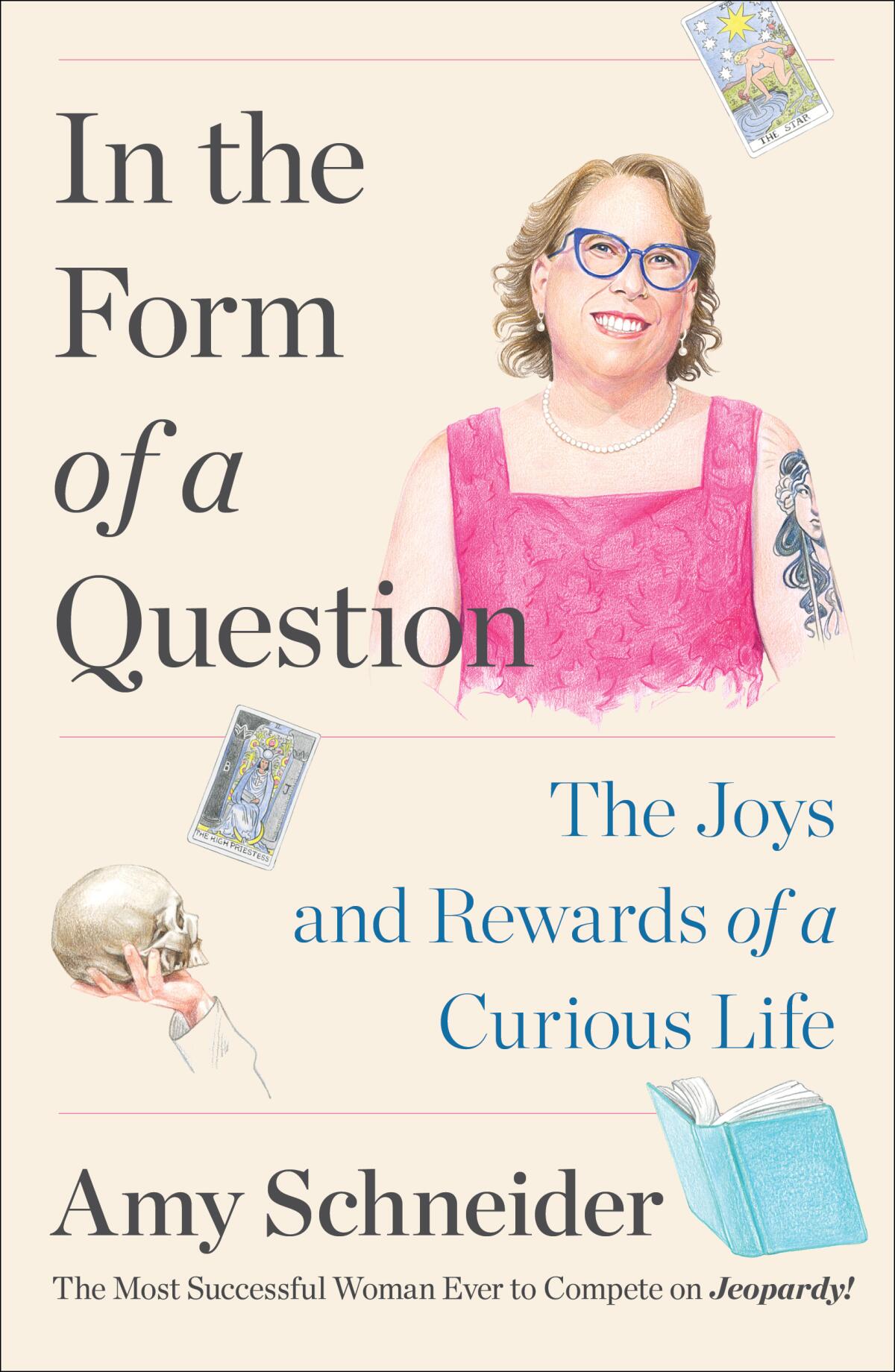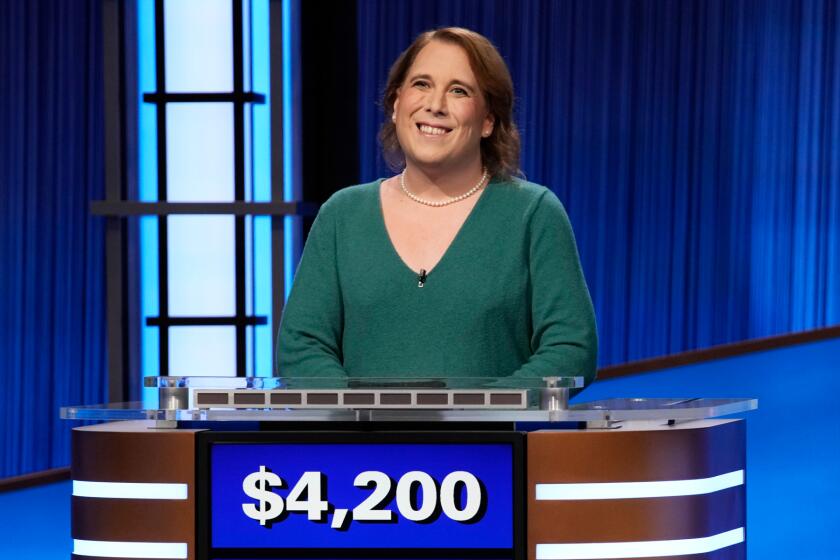‘Jeopardy’ vet Amy Schneider runs the board on drugs, polyamory, transphobia and more

On the Shelf
In the Form of a Question: The Joys and Rewards of a Curious Life
By Amy Schneider
Avid Reader: 272 pages, $28
If you buy books linked on our site, The Times may earn a commission from Bookshop.org, whose fees support independent bookstores.
How do you win more than $1,382,800 on a historic game show run?
It helps to be “addicted to learning,” writes Amy Schneider in her new book, out next week. “Learning was my first drug, my oldest form of self-medicating.”
“In the Form of a Question: The Joys and Rewards of a Curious Life” mines Schneider’s history — acid trips, polyamory, marriage, gender transition and a spontaneous night with a sex worker — before her history-making moment on “Jeopardy!”
Last year, the Oakland-based trivia whiz became the most successful woman in the competition’s history, holding the second-longest winning streak behind Ken Jennings, a host for the program’s 40th season.
Schneider also earned the grand prize at the 2022 Tournament of Champions, another $250,000 to add to her “Jeopardy!” winnings.
Amy Schneider has yet another ‘Jeopardy!’ win under her belt. On Monday, the Oakland trivia queen won this year’s Tournament of Champions.
So, how does she know all that stuff? And how did it feel to go from a Silicon Valley software engineer to a self-proclaimed “famous celebrity trans person”? Get ready for some surprises among these key takeaways from her memoir.
The Boy Scouts helped Schneider realize she was trans.
In hindsight, the only thing she learned from her “nightmare” experience in the Boy Scouts was that “I’m not a boy.”
She found it “disgusting and disturbing.” It didn’t help that she was pressured to watch a boy vivisect a live crawfish with his pocket knife.
To this day, she says men still make her feel uncomfortable, but she’s working on it.
Leonardo DiCaprio helped her realize she wasn’t into men.
A failed attempt to pleasure herself while watching “Romeo + Juliet” led to a revelation: If Leo didn’t turn her on, no male of the species could. “It didn’t work,” she writes. “I simply didn’t like boys.”
And ‘Daria’ saved her life.
Schneider writes that, ahead of her senior year at the University of Dayton, “while suicide held no appeal for me, staying alive didn’t seem that tempting, either.” The Ohio native credits MTV’s animated show “Daria” for helping her persevere. “If Daria could survive this Sick Sad World, then so could I,” she recalls.

After transitioning, she almost gave up on her ‘Jeopardy!’ dream
Every year for 15 years, Schneider auditioned for the quiz show. But when she began living as a woman, she initially gave up on her dream, thinking she’d never be comfortable going on TV. At the time, leaving her apartment felt “almost existentially frightening,” and she was self-conscious about her deep voice.
Schneider ultimately decided that her fear didn’t outweigh the potentially transcendent joy of achieving her lifelong goal. Besides, it wasn’t just about her anymore.
“I realized that being trans in public carried responsibilities,” she writes. “To hide my voice began to feel like a betrayal to my community.”
J.K. Rowling continues to insist she’s not transphobic while making transphobic statements. Will the new podcast ‘The Witch Trials of J.K. Rowling’ clear things up? Consider the title.
She has some thoughts on trans-friendly bathrooms and J.K. Rowling.
Schneider recalls a time on X, then Twitter, when she spoke out against “a certain billionaire YA author” after the New York Times published an opinion piece, “In Defense of J.K. Rowling,” asserting the right to spaces for biological women only.
After receiving a flood of online hate, Schneider says what hurt the most was being accused of victimizing or endangering women. “I am a woman! If I’m putting women in danger, then I’m putting myself in danger. Why would I want to do that?”
“The whole trans issue is just not that hard!” she continues. “Take me at my word when I tell you I’m a woman. After that, these ‘controversies’ will seem trivial. Should I be allowed in a woman’s bathroom? Well, duh. I’m a woman. ... Trans people are just people. They need to pee sometimes. Let them.”
She thinks everyone should be polyamorous.
At 25, Schneider met her first wife, Kelly, then just shy of 22. At the time, Schneider had never been kissed and had no sexual experience, aside from spontaneous oral sex from a sex worker when she was 20. The married couple decided to be polyamorous, and it’s a way of life Schneider still believes in.
“I think everybody should be poly,” Schneider writes. “Most people do not agree with that, and that’s okay.” Schneider’s polyamorous first marriage ended with Kelly leaving her for someone she was dating outside of marriage. (That relationship fizzled after a few months.)

Schneider is not shy about recreational drug use.
Her curious mind led her to dabble in drugs, including cocaine, Vicodin, mushrooms and acid — in the spirit of feeling what it’s like to have “a different brain for a while.”
She writes, “I have used, and continue to use, a wide variety of drugs. I believe that drugs have been good for me. Without them I might not be here today.” She says she feels a responsibility to share her perspective, since “the lived experience of actual drug users doesn’t get a lot of exposure.”
Oakland hero and ‘Jeopardy!’ champion Amy Schneider discusses her trailblazing winning streak, popular Twitter threads and love for the Bay Area.
She doesn’t mince words about politics and transphobia.
Schneider was raised in a strict Catholic household, believing that “failing at boy-ness was an unforgivable sin.” Her faith waned through the years, but she hit a point-of-no-return on the night of George W. Bush‘s 2000 presidential election. That’s because her sincere prayer for Al Gore’s victory was so rudely ignored, it helped complete her journey to atheism.
She calls out former President Donald Trump as a “vulgar sexist racist idiot,” and cites with pride her testimony in December 2022 at the Ohio Statehouse against her home state’s House Bill 454, which would have barred doctors from providing gender-affirming care to minors. Schneider argued that this medical care is “literally lifesaving.”
“What I did to become famous was answer a bunch of trivia questions,” she writes. “I’m proud of how I did that, and I’m honored that people connected with me.” Testifying was part of “the work of using that fame for good.”

Not everyone in her life has fully supported her.
As Schneider’s faith cracked, so did the 30-year-long facade of an “ugly, ill-fitting boy costume.”
She started cross-dressing at home in private, hiding a pair of heels and other clothing from her then-wife Kelly. When she built up the courage to broach the subject, “it seemed clear to me this was not a part of my life she had any interest in sharing.”
In 2016, Kelly abruptly left. Schneider journaled that day, “Maybe I’ll try being a pirate for a while. Or a writer, or a woman.”
Schneider describes her parents at times as denying and dismissive. She writes that while her mom often denied the existence of Schneider’s ADD, her dad “usually handled the disparagement of trans people.” In the book’s acknowledgments, she writes, “Dad, if you’re out there: You did enough. You did your job. Thanks.”
ADD may be the secret to ‘Jeopardy!’ stardom.
The trivia phenom credits her laziness and ADD for her success on the show. Spending years learning about several subjects briefly only to give up and move on to the next thing helped her accrue random facts — like the name of a Finnish distance runner from the 1920s. “Not that there’s any remotely conceivable reason you should know that.”
Schneider will participate in a moderated conversation about “In the Form of a Question” with Guy Branum in Los Angeles on Oct. 12.
More to Read
Sign up for our Book Club newsletter
Get the latest news, events and more from the Los Angeles Times Book Club, and help us get L.A. reading and talking.
You may occasionally receive promotional content from the Los Angeles Times.











